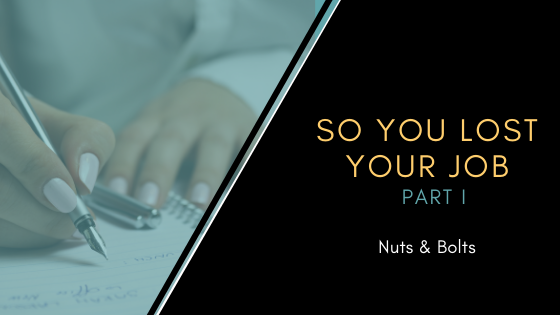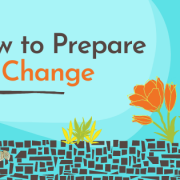So You Lost Your Job, Part 1: Nuts and Bolts
Leaving Your Job
Even though the world is stressful enough right now, layoffs are still happening and the stress just keeps piling on. If you have been laid off, know that you’re not alone and you can get through this. Losing a job is a traumatic experience, and taking it for all that it is (and isn’t) will help you come out the other side better.
Let’s take a look at the first few things you should do before making any big decisions or freaking out. (Well, you can freak out right now, just don’t overdo it, okay?)
Allow yourself to grieve
Let yourself feel angry, hurt, scared, depressed, frustrated, happy, relieved, whatever it may be. Do this for the next month. Allow whatever emotions arise. Having decisions made for you is not an easy experience, and whatever you’re feeling is okay.
Don’t take it personally
Getting laid off can feel like a personal hit. And lots of managers are not that great at the actual laying off process, so feelings might be doubly hurt. But being let go rarely has anything to do with you. According to the Corporate Finance Institute, “A layoff is the fault of an employer while a firing occurs because of the employee’s fault.” Times are hard right now, for individuals and businesses. There are lots of reasons why you were let go and not someone else, and it has absolutely nothing to do with you.
File for unemployment
Don’t delay on this. (Although I’d suggest waiting a day—I know of one person who immediately filed for unemployment after they got home, and due to the stress of it all, they filled it out incorrectly and had to wait months for checks to arrive.) If you’ve never filed for it before, the process is easy (it’s the getting of funds that can cause headaches). All you have to do is fill out a simple form. Keep doing this every week.
Do you need to file for unemployment if you’re not strapped for cash? It’s a good idea to apply anyway. Who knows what the future will bring. Being frugal now will enable you to endure the long job search process. Plus, it’s money that you’re entitled to; your previous employer paid that money for you, so you might as well take it.
Talk with people
Tell your close ones about your job loss, especially household members. Going through this alone is completely unnecessary and only causes more stress and harm in the long run. Have an honest conversation about the details of your layoff. Ask for support and patience. And make sure they know that this open conversation policy should continue in the coming months.
Decide what you want to do with your 401k
Your options are to leave what you have saved in that account, transfer it to a new 401k, roll it over to an IRA, or cash out. Check out this helpful guide from Balance Careers. If you’re still unsure about your specific situation, you can always call the HR department of your previous employer for help or clarity. While they’re not legally required to continue helping you, most will offer guidance if you ask for it!
Check out health insurance options
You’ll want to figure out how long your health care will last and what you should get next: COBRA or the Affordable Care Act marketplace. Healthcare.gov has some helpful hints, as does MarketWatch.
Gather all documents you might need
Make sure you have anything you might need in your future job search: past performance reports, a copy of your job description, any work samples, or other similar documents. It wouldn’t hurt to get a couple of references or testimonials while you’re at it. (And if you’re reading this and haven’t lost your job, you should be doing this now—it’s always good to have these things on hand and in the back of your mind!)
Start a budget
Look at your savings and what you’ll be getting with each unemployment check. See what you have to play with financially. This quick guide from CNBC will help you prioritize. If you have dependents or have a partner, work together on this. It can feel like you’re alone in this, since you are the one who lost your job, not your partner; but that’s not the reality of it. And working together will ease the burden on both of you. (See more about how to cope here.)
Use the right words—laid off, not fired
When talking about your job loss to other people, especially while networking and interviewing, make sure you use the right word. If you were let go due to circumstances stemming from the employer, use words like “let go,” “laid off,” “displaced,” etc., and your company may be going through a “mass layoff,” “downsizing,” or “reduction in force (RIF).” If you were dismissed due to a fault of your own, you’d use words like “fired.”
And here’s where you have a choice: Do you try to find a job right away? Or do you take some time to build on or change your career path? I take a look at both options here. But first, before you jump toward getting a new career, you should reflect on the reality and emotions behind losing your job—a little reflection and acceptance first will make the rest go a lot smoother.

I’m Stacey Lane: Career Coach | Transition & Career Strategist | Personal Brand Specialist
I help individuals with unique backgrounds find their perfect fit and effectively market themselves so they find work that is as interesting as they are.
Contact me to get started!



